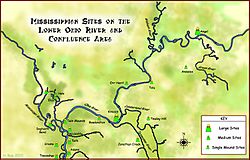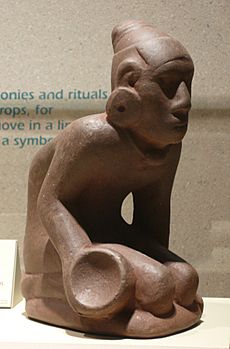Twin Mounds Site facts for kids

Mississippian sites on the Lower Ohio River
|
|
| Alternative name | Nolan Site, Village area designated 15BA14 |
|---|---|
| Location | Cairo, Illinois, Ballard County, Kentucky, |
| Region | Jackson Purchase |
| Coordinates | 37°4′3.50″N 89°8′38.58″W / 37.0676389°N 89.1440500°W |
| History | |
| Founded | 1300 CE |
| Cultures | Mississippian culture |
| Site notes | |
| Architecture | |
| Architectural styles | Platform mound |
| Responsible body: private | |
The Twin Mounds Site is an ancient place where people from the Mississippian culture used to live. It's also called the Nolan Site. You can find it near Barlow, Kentucky in Ballard County, Kentucky. It's special because it's located right where the Ohio River and Mississippi River meet. It's also directly across the Ohio River from Mound City, Illinois.
Contents
What Was the Twin Mounds Site?
The Twin Mounds Site was an important center for the Mississippian people. It had two big platform mounds built around a central open area called a plaza. There was also a large village nearby with a thick layer of old trash and remains, about 2 metres (6.6 ft) deep. This layer is called a midden.
When Was the Site Used?
Most people lived at the Twin Mounds Site from about 1200 CE to 1450 CE. This time is known as the Dorena and Medley phases in the local history. However, archaeologists also found some pottery from an even older time, called the Late Woodland period.
How Does it Compare to Other Sites?
For much of its history, the Twin Mounds Site was used at the same time as another nearby place called Wickliffe Mounds. Wickliffe Mounds is a few miles to the southeast. Experts believe that as people slowly left Wickliffe Mounds around 1300 CE, they moved to the Twin Mounds Site instead.
Amazing Art Found at the Site
Archaeologists found a very special piece of art at the Twin Mounds Site. It's a Cahokia human effigy pipe. This means it's a pipe shaped like a person.
What Does the Pipe Look Like?
The pipe is carved from a special red stone called Missouri flint clay. This stone is easy to carve and is only found in eastern Missouri, across the Mississippi River. The pipe is about 17.8 centimetres (7.0 in) tall. It shows a male figure crouching down and leaning forward a little bit. He is sitting on a small base.
What is the Pipe's Story?
This pipe looks a lot like another figurine found in Oklahoma, which is called the "Chunkey player." Many of the male figures carved from flint clay by the Cahokia people are linked to old stories. These stories are part of the Siouan oral traditions, especially the "Red Horn" myth. We don't know exactly which part of these stories the "Crouching figure" pipe represents.
In 2004, this special pipe was shown at an art exhibition called "Hero, Hawk, and Open Hand: American Indian Art of the Ancient Midwest and South." It was borrowed from a private collection for the show.
 | William L. Dawson |
 | W. E. B. Du Bois |
 | Harry Belafonte |



